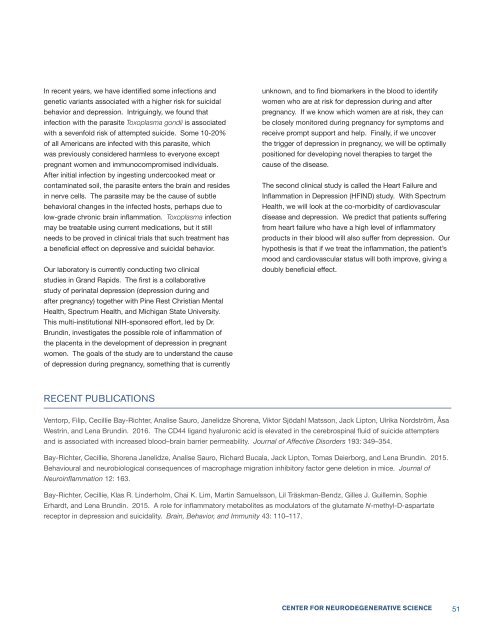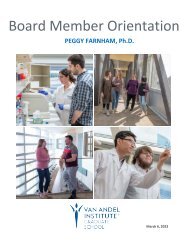2016 Scientific Report
You also want an ePaper? Increase the reach of your titles
YUMPU automatically turns print PDFs into web optimized ePapers that Google loves.
In recent years, we have identified some infections and<br />
genetic variants associated with a higher risk for suicidal<br />
behavior and depression. Intriguingly, we found that<br />
infection with the parasite Toxoplasma gondii is associated<br />
with a sevenfold risk of attempted suicide. Some 10-20%<br />
of all Americans are infected with this parasite, which<br />
was previously considered harmless to everyone except<br />
pregnant women and immunocompromised individuals.<br />
After initial infection by ingesting undercooked meat or<br />
contaminated soil, the parasite enters the brain and resides<br />
in nerve cells. The parasite may be the cause of subtle<br />
behavioral changes in the infected hosts, perhaps due to<br />
low-grade chronic brain inflammation. Toxoplasma infection<br />
may be treatable using current medications, but it still<br />
needs to be proved in clinical trials that such treatment has<br />
a beneficial effect on depressive and suicidal behavior.<br />
Our laboratory is currently conducting two clinical<br />
studies in Grand Rapids. The first is a collaborative<br />
study of perinatal depression (depression during and<br />
after pregnancy) together with Pine Rest Christian Mental<br />
Health, Spectrum Health, and Michigan State University.<br />
This multi-institutional NIH-sponsored effort, led by Dr.<br />
Brundin, investigates the possible role of inflammation of<br />
the placenta in the development of depression in pregnant<br />
women. The goals of the study are to understand the cause<br />
of depression during pregnancy, something that is currently<br />
unknown, and to find biomarkers in the blood to identify<br />
women who are at risk for depression during and after<br />
pregnancy. If we know which women are at risk, they can<br />
be closely monitored during pregnancy for symptoms and<br />
receive prompt support and help. Finally, if we uncover<br />
the trigger of depression in pregnancy, we will be optimally<br />
positioned for developing novel therapies to target the<br />
cause of the disease.<br />
The second clinical study is called the Heart Failure and<br />
Inflammation in Depression (HFIND) study. With Spectrum<br />
Health, we will look at the co-morbidity of cardiovascular<br />
disease and depression. We predict that patients suffering<br />
from heart failure who have a high level of inflammatory<br />
products in their blood will also suffer from depression. Our<br />
hypothesis is that if we treat the inflammation, the patient’s<br />
mood and cardiovascular status will both improve, giving a<br />
doubly beneficial effect.<br />
RECENT PUBLICATIONS<br />
Ventorp, Filip, Cecillie Bay-Richter, Analise Sauro, Janelidze Shorena, Viktor Sjödahl Matsson, Jack Lipton, Ulrika Nordström, Åsa<br />
Westrin, and Lena Brundin. <strong>2016</strong>. The CD44 ligand hyaluronic acid is elevated in the cerebrospinal fluid of suicide attempters<br />
and is associated with increased blood–brain barrier permeability. Journal of Affective Disorders 193: 349–354.<br />
Bay-Richter, Cecillie, Shorena Janelidze, Analise Sauro, Richard Bucala, Jack Lipton, Tomas Deierborg, and Lena Brundin. 2015.<br />
Behavioural and neurobiological consequences of macrophage migration inhibitory factor gene deletion in mice. Journal of<br />
Neuroinflammation 12: 163.<br />
Bay-Richter, Cecillie, Klas R. Linderholm, Chai K. Lim, Martin Samuelsson, Lil Träskman-Bendz, Gilles J. Guillemin, Sophie<br />
Erhardt, and Lena Brundin. 2015. A role for inflammatory metabolites as modulators of the glutamate N-methyl-D-aspartate<br />
receptor in depression and suicidality. Brain, Behavior, and Immunity 43: 110–117.<br />
CENTER FOR NEURODEGENERATIVE SCIENCE<br />
51

















